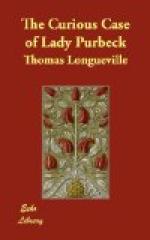Rather than lose his prize, Coke, the great lawyer, determined to defy the law, and to run all risks, risks which the bride seemed anxious to make as great as possible; for, at her earnest request, or rather dictation, the pair were married in a private house, without license or banns, and in the evening, less than five months after Coke had made the entry in his diary canonising Bridget. As the Archbishop had been his tutor, Coke may have expected him to overlook this little transgression. Instead of this, the pious Primate at once ordered a suit to be instituted in his Court against the bridegroom, the bride, the parson who had married them, and the bride’s father, Lord Burghley, who had given her away. Lord Campbell says that “a libel was exhibited against them, concluding for the ‘greater excommunication’ as the appropriate punishment.”
Mr. Attorney now saw that there was nothing to be done but to kiss the rod. Accordingly, he made a humble and a grovelling submission, on which the Archbishop gave a dispensation under his great seal, a dispensation which is registered in the archives of Lambeth Palace, absolving all concerned from the penalties they had incurred, and, as if to complete the joke, alleging, as an excuse, ignorance of the law on the part of the most learned lawyer in the kingdom.
The newly married pair had not a single taste in common. The wife loved balls, masques, hawking, and all sorts of gaiety; she delighted in admiration and loved to be surrounded by young gallants who had served in the wars under Sydney and Essex, and who could flatter her with apt quotations from the verses of Spenser and Surrey. The husband, on the contrary, detested everything in the form of fun and frolic, loved nothing but law and money, loathed extravagance and cared for no society, except that of middle-aged barristers and old judges. As might be expected, the union of this singularly ill-assorted couple was a most unhappy one. Indeed it was a case of—
“at
home ’tis steadfast hate,
And one eternal tempest of debate."[1]
Within a year of their marriage, that is to say in 1599, Lady Elizabeth Hatton, as she still called herself, had a daughter. Here again Burke and Lord Campbell are at variance. Burke says that by this marriage Coke had two daughters, Elizabeth, who died unmarried, and Frances, our heroine; whereas Lord Campbell says that Frances was born within a year of their marriage and makes no mention of any Elizabeth. It is pretty clear, from subsequent events, that, if there was an Elizabeth, she must have died very young, and that Frances must have been born almost as soon as was possible after the birth of her elder sister.[2]
The beginning of our heroine may make the end of our chapter. In the next she will not be seen at all; but, as will duly appear, the events therein recorded had a great—it might almost be said a supreme—influence on her fortunes.




